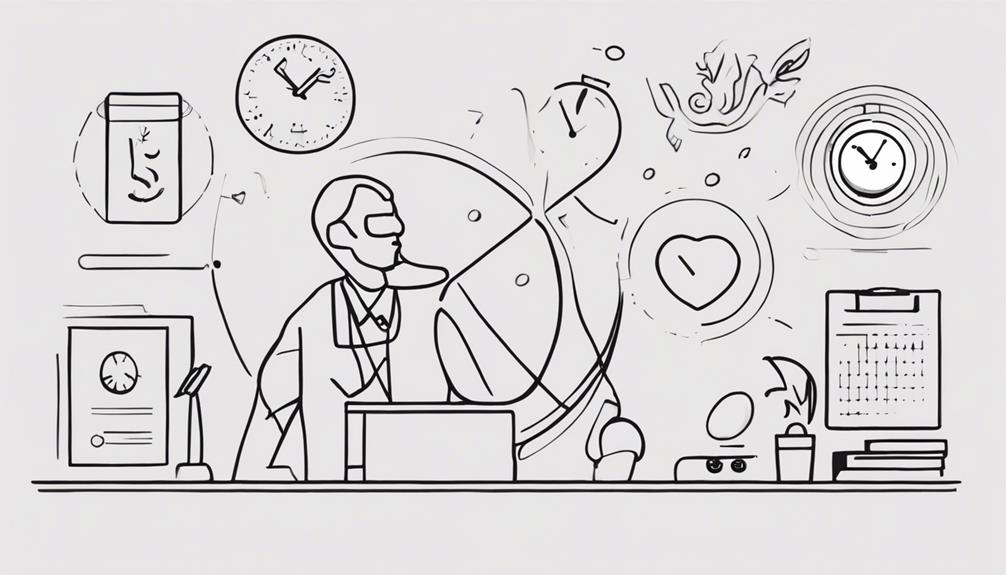In a world filled with constant demands and expectations, the idea of leading a balanced life can often seem like an elusive dream. Many claim to have found the secret formula, yet skepticism arises when faced with the complexities of modern existence. How does one truly achieve harmony among the chaos of daily life? Is it merely about time management and setting boundaries, or does it delve deeper into the essence of human nature and fulfillment? Let's explore the intricacies of balancing the scales of life, unraveling the myths and uncovering the truths that lie beneath the surface.
Key Takeaways
- Work-life balance ensures overall well-being and productivity.
- Setting boundaries is crucial for a healthy balance.
- Time management strategies optimize productivity.
- Self-care practices enhance harmony and fulfillment.
The Concept of Work-Life Balance

The concept of work-life balance, a term that gained prominence in the 1980s, is a strategic approach aimed at harmonizing professional responsibilities with personal well-being. This equilibrium is not merely a modern buzzword but a critical factor influencing various aspects of individuals' lives. Achieving work-life balance is essential for promoting gender equality in the workplace by ensuring equal opportunities for both men and women to excel in their careers while maintaining fulfilling personal lives. Moreover, studies have shown that a balanced life significantly impacts job satisfaction, mental health, and physical well-being. Individuals who effectively manage their work and personal obligations tend to experience lower levels of stress and anxiety, leading to improved overall mental health. Furthermore, maintaining a healthy work-life balance is closely linked to physical health outcomes such as reduced risk of burnout, better sleep patterns, and increased levels of energy and productivity in both professional and personal spheres.
Setting Priorities and Boundaries
Establishing clear priorities and boundaries is fundamental for individuals aiming to maintain a healthy work-life balance and prevent burnout. Setting priorities enables individuals to manage their time efficiently by focusing on essential tasks, which in turn enhances productivity and decision-making. By delineating boundaries between work and personal life, individuals can create a separation that promotes a healthier balance. This separation allows for the allocation of time towards self-care activities and relaxation without the burden of guilt. Prioritizing tasks based on importance ensures that time is allocated effectively, leading to a more balanced life overall. Furthermore, effective boundaries not only prevent work from encroaching on personal time but also ensure that personal time is respected and valued. This, in turn, contributes to improved health, well-being, and satisfaction in both professional and personal aspects of life. Thus, setting priorities and boundaries is crucial in achieving a harmonious work-life balance and fostering overall health and happiness.
Time Management Strategies

To effectively navigate the demands of a modern lifestyle, mastering efficient time management strategies is paramount. Many people think that creating balance in life is about finding more time, but it is more about making the best use of the time available. Setting clear goals and priorities is essential in this process. By utilizing tools like calendars, to-do lists, and time blocking, individuals can enhance their productivity and ensure that important tasks are completed on time. Prioritizing tasks based on their importance and deadlines can significantly help in managing time efficiently. It is also crucial to avoid multitasking and focus on one task at a time to improve time management skills. Regularly reviewing and adjusting schedules can aid in staying on track with time management goals. Remember, achieving balance in life also involves making time for self-care practices like physical exercise, which can further boost productivity and overall well-being.
Self-Care Practices for Balance
How can individuals effectively incorporate self-care practices into their daily routines to achieve a balanced lifestyle? Taking care of oneself, both physically and mentally, is essential in finding balance amidst life's demands. Balance comes from nurturing your well-being in various ways, including:
- Weekly De-Stressing Activities: Setting aside dedicated time each week for activities that help you unwind and relax is crucial for maintaining a sense of balance in your life.
- Daily Relaxation Moments: Incorporating brief moments of relaxation, such as breathing exercises or mindfulness practices, can promote a sense of calm and overall well-being.
- Enjoyable Daily Rituals: Starting your day a few minutes early to enjoy a quiet moment, like savoring a cup of tea, can set a positive tone for the rest of the day and enhance your overall well-being.
Tips for Achieving Work-Life Harmony

Prioritizing a healthy work-life balance is crucial for overall well-being and productivity in today's fast-paced society. To achieve work-life harmony, individuals must take care to set clear boundaries between their professional and personal lives. Making time for self-care activities, such as exercise and relaxation, is essential for maintaining balance in your life. Additionally, ensuring you have healthy meals throughout the day can provide the necessary energy to tackle both work and personal responsibilities effectively. Seeking support from family, friends, or colleagues when needed is not a sign of weakness but a recognition of the importance of collaboration in achieving work-life balance. Effective time management strategies, like creating schedules and to-do lists, can help individuals juggle their various commitments. By incorporating these tips into daily life, individuals can strive towards a more harmonious and fulfilling existence.
| Tips for Achieving Work-Life Harmony | ||
|---|---|---|
| Take care | Balance in your life | Healthy meals |
| Making time | Need help |
Frequently Asked Questions
What Does It Mean to Live a Balanced Life?
Leading a balanced life entails managing work-life balance, fostering healthy relationships, prioritizing mental well-being, engaging in regular physical activity, and mastering effective time management. Achieving equilibrium in these areas promotes overall wellness and productivity. It involves making conscious choices to allocate time and energy efficiently, setting boundaries, and ensuring self-care practices are consistently maintained. Embracing these principles can lead to a more fulfilling and harmonious lifestyle.
How Do You Lead a Balanced Life?
In leading a balanced life, effective time management is crucial. Prioritizing self-care, setting healthy boundaries, and maintaining a work-life balance are essential components. Incorporating mindfulness practices can enhance mental clarity and emotional stability. By allocating time for relaxation and social connections, individuals can nurture overall well-being. Seeking support from loved ones or professionals can help navigate challenges and create a harmonious lifestyle.
What Does It Mean to Lead a Balanced?
Work life balance entails harmonizing professional obligations with personal life, fostering mental health, managing time effectively, prioritizing self-care, and responsibilities. Achieving balance necessitates setting boundaries, saying no when needed, celebrating accomplishments, and incorporating rest, activity, reflection, and goal visualization. It involves a holistic approach to life, integrating all facets to maintain equilibrium and well-being. Balancing work, personal time, and self-care is crucial for overall satisfaction and fulfillment.
What Are the 4 Areas of Life That Lead to a Balanced Life?
Mental health, physical wellness, work-life balance, social connections, and personal growth are integral aspects of leading a balanced life. These dimensions collectively contribute to overall well-being and fulfillment. Research shows that individuals who prioritize these areas experience reduced stress levels and increased happiness. By nurturing these components, individuals can cultivate a harmonious lifestyle that supports their emotional, physical, and psychological needs, ultimately leading to a more balanced and fulfilling life.
Conclusion
In conclusion, leading a balanced life involves prioritizing self-care, setting boundaries, and integrating various aspects of one's existence. According to a study by the World Health Organization, individuals who practice self-care and prioritize well-being are 30% more likely to report higher levels of overall satisfaction and fulfillment in their lives. Therefore, it is crucial to cultivate a sense of harmony and strive for balance in order to achieve a fulfilling and meaningful life.
